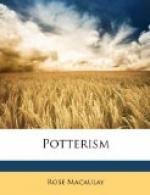CHAPTER II
ANTI-POTTERS
1
The quest of Potterism, its causes and its cure, took the party of investigation first to the Cornish coast. Partly because of bathing and boating, and partly because Gideon, the organiser of the party, wanted to find out if there was much Potterism in Cornwall, or if Celticism had withstood it. For Potterism, they had decided, was mainly an Anglo-Saxon disease. Worst of all in America, that great home of commerce, success, and the booming of the second-rate. Less discernible in the Latin countries, which they hoped later on to explore, and hardly existing in the Slavs. In Russia, said Gideon, who loathed Russians, because he was half a Jew, it practically did not exist. The Russians were without shame and without cant, saw things as they were, and proceeded to make them a good deal worse. That was barbarity, imbecility, and devilishness, but it was not Potterism, said Gideon grimly. Gideon’s grandparents had been massacred in an Odessa pogrom; his father had been taken at the age of five to England by an aunt, become naturalised, taken the name of Sidney, married an Englishwoman, and achieved success and wealth as a banker. His son Arthur was one of the most brilliant men of his year at Oxford, regarded Russians, Jews, and British with cynical dislike, and had, on turning twenty-one, reverted to his family name in its English form, finding it a Potterish act on his father’s part to have become Sidney. Few of his friends remembered to call him by his new name, and his parents ignored it, but to wear it gave him a grim satisfaction.
Such was Arthur Gideon, a lean-faced, black-eyed man, biting his nails like Fagin when he got excited.
The other man, besides Johnny Potter, was the Honourable Laurence Juke, a Radical of moderately aristocratic lineage, a clever writer and actor, who had just taken deacon’s orders. Juke had a look at once languid and amused, a well-shaped, smooth brown head, blunt features, the introspective, wide-set eyes of the mystic, and the sweet, flexible voice of the actor (his mother had, in fact, been a well-known actress of the eighties).
The two women were Jane Potter and Katherine Varick. Katherine Varick had frosty blue eyes, a pale, square-jawed, slightly cynical face, a first in Natural Science, and a chemical research fellowship.
In those happy days it was easy to stay in places, even by the sea, and they stayed first at the fishing village of Mevagissey. Gideon was the only one who never forgot that they were to make observations and write a book. He came of a more hard-working race than the others did. Often the others merely fished, boated, bathed, and walked, and forgot the object of their tour. But Gideon, though he too did these things, did them, so to speak, notebook in hand. He was out to find and analyse Potterism, so much of it as lay hid in the rocky Cornish coves and the grave Cornish people. Katherine Varick was the only member of the party who knew that he was also seeking and finding it in the hidden souls of his fellow-seekers.




